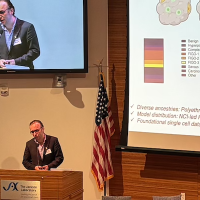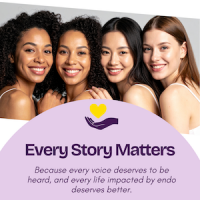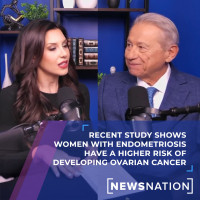Padma Lakshmi: I have always been someone who has been lucky enough to have access to the best healthcare. I saw doctors regularly, I went for regular gynaecological checkups and I was told that I am just someone who has cramps with their period. I knew I would get them because my mother told me she had them and they were very painful for her. Pain, numbness but no one really said the word endometriosis to me, until I met Dr. Seckin.
Tamer Seckin MD: Endometriosis is probably the least researched subject in women’s health care in America.
Padma Lakshmi: It was scary because he also told me that my fertility was at grave danger.
Peter Gregersen, MD: About 50 percent of infertility is associated with endometriosis.
Tamer Seckin, MD: We are diagnosing the disease so late in the game that these women end up having terribly low worth quality of life. Presently treatment of endometriosis surgery, which is invasive and costly, is usually very late.
Padma Lakshmi: My surgery took four and a half hours and I was bed ridden from Thanksgiving to the first week of February. I wanted to turn my pain into something positive so we started the Endometriosis Foundation of America. The goals of Endofound are public awareness, patient advocacy and research. Without research we are just flailing in the dark.
Peter Gregersen, MD: This is a disease that we can understand. It just has not had the kind of sustained attention in terms of basic research that many other common diseases have.
Tamer Seckin, MD: No institution in the world will match the quality of research that will be done at Feinstein Institute.
Kevin Tracey, MD: Research is the process of creating the future. Feinstein Institute is the home for research in the North Shore LIJ health system. It is home to some two thousand five hundred people who do clinical trials across the health system, or run the 55 laboratories in the building.
Michael J. Dowling: Our commitment is extraordinary in terms of what we do with ___ research. We have, for example, about 15,000 people in clinical trials. That is one of the largest in the United States.
Kevin Tracey, MD: Our scientific leadership is unparalleled from molecular genetics to inflammation to autoimmune diseases.
Peter Gregersen, MD: Dr. Seckin came to visit me and we started talking about what the possible causes of endometriosis could be. I got every intrigued with a type of cell in the lining of the uterus.
Kevin Tracey, MD: Dr. Peter Gregersen is an internationally renowned leader in molecular genetics.
Padma Lakshmi: I was very excited when somebody of the reputation of Dr. Gregersen was interested in endometriosis.
Tamer Seckin, MD: Dr. Gregersen is a gift to a cause like endometriosis. I think the history will be rewritten with his work.
Peter Gregersen, MD: My interaction with Dr. Seckin is a perfect example of why the Feinstein works. Dr. Seckin has started a foundation, which has been kind enough to support us here.
Tamer Seckin, MD: Our partnership of Endometriosis Foundation of America with the Feinstein Institute will make a difference in the future care of endometriosis.
Kevin Tracey, MD: The Feinstein Institute will be producing cures based on the knowledge that we are producing today. These cures in some form may be pills or injections. But in other forms may be small, implanted electronic devices that control the activity of nerves for the benefit of our patients.
Tamer Seckin, MD: My most gratifying moments are receiving a phone call saying that someone is pregnant.
Padma Lakshmi: After starting the foundation in April 2009 I found out I was pregnant. I am feeling great today and I am so thankful that we will be able to use what happened to me to help do the research we need to find out how to alleviate this disease and other diseases like it.
Tamer Seckin, MD: With good research we are finding that we can prevent some types of ovarian cancers with early intervention and removing the disease.
Kevin Tracey, MD: There has never been a more important time to support research than today. The steps we need to make to move forward towards cures require philanthropy, without that we will not succeed.
Michael J. Dowling: It requires a family effort. In the health system itself there will be such as a Feinstein, the dawn of community, the public at large to people who actually volunteer to be part of clinical trials working in a holistic, synergistic way to promote the discovery of new cures.
Peter Gregersen, MD: There are wonderfully philanthropic individuals who get it. Those individuals are absolutely critical to progress.
Kevin Tracey, MD: The knowledge produced here today will generate the cures that our patients will enjoy tomorrow








